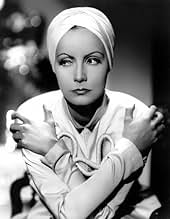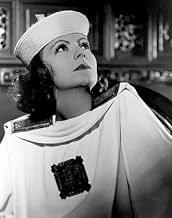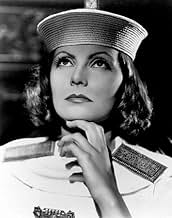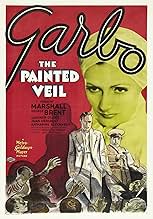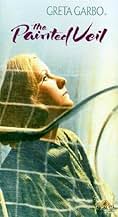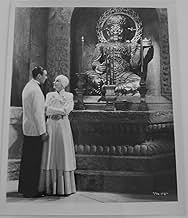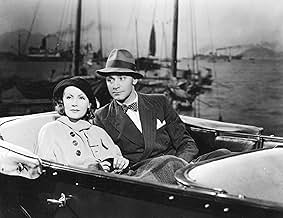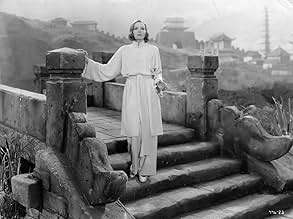IMDb-BEWERTUNG
6,5/10
1824
IHRE BEWERTUNG
Füge eine Handlung in deiner Sprache hinzuA wife neglected by her husband, a medical researcher in China, falls in love with a dashing diplomatic attaché.A wife neglected by her husband, a medical researcher in China, falls in love with a dashing diplomatic attaché.A wife neglected by her husband, a medical researcher in China, falls in love with a dashing diplomatic attaché.
- Auszeichnungen
- 2 wins total
Robert Adair
- Polo Player
- (Gelöschte Szenen)
Mariska Aldrich
- German Teacher
- (Gelöschte Szenen)
Maidena Armstrong
- German
- (Gelöschte Szenen)
Billy Bevan
- Bridegroom
- (Gelöschte Szenen)
Beulah Bondi
- Frau Koerber
- (Gelöschte Szenen)
W.H. Davis
- German
- (Gelöschte Szenen)
Vernon Dent
- Chief of Police
- (Gelöschte Szenen)
Empfohlene Bewertungen
This movie is imperfect, but I love it anyway.
Its imperfections:
The soundstage China of 1933's "Bitter Tea of General Yen" leaves the soundstage China of 1934's "Painted Veil" in the dust. "Yen's" China draws you in and intoxicates you. "Painted Veil's" China is fun, but it's a bit silly and superficial. A San Francisco Chinatown Chinese New Year's parade would be more profound.
George Brent is at his worst here. I've never seen him do anything quite like what he does here -- a fly-by-night and exploitative romancer who toys with women's hearts.
Brent wasn't great looking, but he was very good at playing the grounded, reliable foil to electric characters like Bette Davis' Judith Traherne in "Dark Victory."
Here, as Townsend, while speaking serious words, Brent adopts a silly smile, and -- literally -- renounces everything he says in the very next sentence. Maybe a much better looking, or more conventionally handsome, actor could have made this character charming in a snake-like, dangerous way (Erroll Flynn?) but Brent didn't really have the equipment to make Townsend as charming to the audience as he might have been to a neglected wife in China.
Garbo plays a near spinster who watches her younger sister marry, and, on the rebound, marries a man she doesn't love out of desperation.
How on earth could anyone make sense of *Garbo* as a desperate spinster? The movie doesn't even try to make sense of that. It just asks us to believe it. The viewer has to try to make up reasons for her spinster status. (Her parents kept her locked in a closet the first thirty or so years of her life? She had a horrible facial deformaty that suddenly fell off?)
BUT!
I still love this movie.
I love it for the moment when Herbert Marshall says, with the kind of real passion you expect of a contemporary production of a Eugene O'Neill play, that he despises himself for loving Garbo, after she has cuckolded him.
It's great to see Marshall, who so often played helpless men ill used by women ("The Letter," "Duel in the Sun," "The Little Foxes"), here finally able to effectively express his bitterness at being so ill used, and take some action in response, even if that action is intended to be fatal.
I love it for the complications that arise in the final portion. Hearts are changed. Suffering and human sacrifice changes them. Love is born of the kind of big events that sometimes do change people, and life stories, in real life.
This ending, though not in compliance with Maughm's novel, didn't strike me as a "Hollywood" "happy" ending at all. It struck me as a profound ending. It reminded me of a more recent film, Bertolucci's "Besieged," that also talks about the role of altruism in love and eroticism.
For those features, I deeply value this movie, in spite of its superficial imperfections.
Its imperfections:
The soundstage China of 1933's "Bitter Tea of General Yen" leaves the soundstage China of 1934's "Painted Veil" in the dust. "Yen's" China draws you in and intoxicates you. "Painted Veil's" China is fun, but it's a bit silly and superficial. A San Francisco Chinatown Chinese New Year's parade would be more profound.
George Brent is at his worst here. I've never seen him do anything quite like what he does here -- a fly-by-night and exploitative romancer who toys with women's hearts.
Brent wasn't great looking, but he was very good at playing the grounded, reliable foil to electric characters like Bette Davis' Judith Traherne in "Dark Victory."
Here, as Townsend, while speaking serious words, Brent adopts a silly smile, and -- literally -- renounces everything he says in the very next sentence. Maybe a much better looking, or more conventionally handsome, actor could have made this character charming in a snake-like, dangerous way (Erroll Flynn?) but Brent didn't really have the equipment to make Townsend as charming to the audience as he might have been to a neglected wife in China.
Garbo plays a near spinster who watches her younger sister marry, and, on the rebound, marries a man she doesn't love out of desperation.
How on earth could anyone make sense of *Garbo* as a desperate spinster? The movie doesn't even try to make sense of that. It just asks us to believe it. The viewer has to try to make up reasons for her spinster status. (Her parents kept her locked in a closet the first thirty or so years of her life? She had a horrible facial deformaty that suddenly fell off?)
BUT!
I still love this movie.
I love it for the moment when Herbert Marshall says, with the kind of real passion you expect of a contemporary production of a Eugene O'Neill play, that he despises himself for loving Garbo, after she has cuckolded him.
It's great to see Marshall, who so often played helpless men ill used by women ("The Letter," "Duel in the Sun," "The Little Foxes"), here finally able to effectively express his bitterness at being so ill used, and take some action in response, even if that action is intended to be fatal.
I love it for the complications that arise in the final portion. Hearts are changed. Suffering and human sacrifice changes them. Love is born of the kind of big events that sometimes do change people, and life stories, in real life.
This ending, though not in compliance with Maughm's novel, didn't strike me as a "Hollywood" "happy" ending at all. It struck me as a profound ending. It reminded me of a more recent film, Bertolucci's "Besieged," that also talks about the role of altruism in love and eroticism.
For those features, I deeply value this movie, in spite of its superficial imperfections.
Married to a distracted English scientist, a beautiful Austrian finds forbidden love beyond THE PAINTED VEIL in China.
Based on a story by W. Somerset Maugham, this MGM film is soap opera of a high order, featuring excellent production values & acting. The dialogue is also refreshingly literate & thoughtful, something of a surprise in a film which might be pigeonholed as just an elaborate potboiler.
Fascinating as always, Greta Garbo is at last showcased in a film whose backdrop & setting matches her for exoticism. Enervated by the overwhelming cultural saturation of pre-war China, she seems freed to be essentially herself - shorn of all needs to bewitch - and is able to give herself over to the seriousness & drama of her character's dilemma. What the viewer is left with is one of her best performances.
The two men in Garbo's life are excellently portrayed by Herbert Marshall & George Brent. Neither characters are without faults, but the actors make them intimately human, revealing some of the loneliness in each man's heart. These actors had distinct similarities, making it something of a bold move for MGM to put them in the same film, but also enabling the viewer to understand why Garbo could love both.
Excellent support is given by gentle Jean Hersholt as Garbo's kindly father; Forrester Harvey as a happy-go-lucky embassy employee in China & Warner Oland as a sympathetic Chinese general.
Movie mavens will recognize Keye Luke as a young doctor and Mary Forbes & Ethel Griffies as British ladies in Hong Kong - all uncredited.
The Chinese scenes show MGM at what it did best - creating another world, utterly realistic, in its back lot.
Based on a story by W. Somerset Maugham, this MGM film is soap opera of a high order, featuring excellent production values & acting. The dialogue is also refreshingly literate & thoughtful, something of a surprise in a film which might be pigeonholed as just an elaborate potboiler.
Fascinating as always, Greta Garbo is at last showcased in a film whose backdrop & setting matches her for exoticism. Enervated by the overwhelming cultural saturation of pre-war China, she seems freed to be essentially herself - shorn of all needs to bewitch - and is able to give herself over to the seriousness & drama of her character's dilemma. What the viewer is left with is one of her best performances.
The two men in Garbo's life are excellently portrayed by Herbert Marshall & George Brent. Neither characters are without faults, but the actors make them intimately human, revealing some of the loneliness in each man's heart. These actors had distinct similarities, making it something of a bold move for MGM to put them in the same film, but also enabling the viewer to understand why Garbo could love both.
Excellent support is given by gentle Jean Hersholt as Garbo's kindly father; Forrester Harvey as a happy-go-lucky embassy employee in China & Warner Oland as a sympathetic Chinese general.
Movie mavens will recognize Keye Luke as a young doctor and Mary Forbes & Ethel Griffies as British ladies in Hong Kong - all uncredited.
The Chinese scenes show MGM at what it did best - creating another world, utterly realistic, in its back lot.
Garbo is luminous in this adaptation of the Somerset Maugham story "The Painted Veil." It's a beautiful, lavish production with great direction from Clarence Brown. The story is a nice adaptation, if truncated. The stars are in especially fine form. George Brent plays a convincing cad. Herbert Marshall is in the role he always played best, as the sincere and kind, but neglected, husband. Other reviewers who noted the morality of the story are correct--this is one of those films which inspires those who watch it to be good people. The moving love story wins the viewer over by the end of the film.
The score and cinematography were lush. The Asian sets were intriguingly exotic and fun to look at. Also interesting were the title scenes at the beginning of the film, in which the name GARBO stays behind the credits. Truly indicative of the heights Garbo's star power had reached by the time THE PAINTED VEIL was released!
The score and cinematography were lush. The Asian sets were intriguingly exotic and fun to look at. Also interesting were the title scenes at the beginning of the film, in which the name GARBO stays behind the credits. Truly indicative of the heights Garbo's star power had reached by the time THE PAINTED VEIL was released!
The best adaptation of Maugham may be "The Letter," but this version of "The Painted Veil," which substantially changes his ending, is very nearly as good-- as subtle, as elegant, and as satisfying as a work of art. Both examine the profound differences and similarities that exist between passion and love, but this film goes deeper, looking at the glory that ensues when, at length, love and passion bloom together.
Much credit goes to William Daniels, who was D.P. for directors from Stroheim to Ichikawa to Bud Yorkin. His framing and silvery lighting give even greater weight to the superb performances by Garbo and the masterful Herbert Marshall. Together Daniels and director Boleslawski allow the two actors to deliver the very affecting and very adult dialog with rare dignity and feeling.
The two kitchen scenes in particular, one in the first sequence, and one near the end, are flawless, and all the better because of being parallels, and because the dialog employs the sheer force of elemental simplicity. In the second scene,when cholera-fighting Marshall finally speaks of his wife's infidelity, he humbly takes some of the blame, saying, "I went blind a little mad. But if all the men who were hurt simply quit — bad business." Garbo at last begins to understand and replies, "Being in love, and letting it smash things as I have, I thought it had the right of way, I really did." She finally realizes that passion, such as hers for her lover, can be both deeply felt and utterly shallow.
One more note about the visual genius on display. A standard cliché, fireworks,is used to suggest orgasm, but it is done as brilliantly and thrillingly as I've ever seen: three or four bursts of sparks shoot into the frame, like nothing so much as ejaculation.
Much credit goes to William Daniels, who was D.P. for directors from Stroheim to Ichikawa to Bud Yorkin. His framing and silvery lighting give even greater weight to the superb performances by Garbo and the masterful Herbert Marshall. Together Daniels and director Boleslawski allow the two actors to deliver the very affecting and very adult dialog with rare dignity and feeling.
The two kitchen scenes in particular, one in the first sequence, and one near the end, are flawless, and all the better because of being parallels, and because the dialog employs the sheer force of elemental simplicity. In the second scene,when cholera-fighting Marshall finally speaks of his wife's infidelity, he humbly takes some of the blame, saying, "I went blind a little mad. But if all the men who were hurt simply quit — bad business." Garbo at last begins to understand and replies, "Being in love, and letting it smash things as I have, I thought it had the right of way, I really did." She finally realizes that passion, such as hers for her lover, can be both deeply felt and utterly shallow.
One more note about the visual genius on display. A standard cliché, fireworks,is used to suggest orgasm, but it is done as brilliantly and thrillingly as I've ever seen: three or four bursts of sparks shoot into the frame, like nothing so much as ejaculation.
GARBO...the five-letter name, synonymous with glamour and mystery, fills the screen and overwhelms the film's title and the rest of the cast. The legendary actress, Greta Garbo, warranted the outsize billing, and her glowing image dominates this romantic triangle based on a novel by W. Somerset Maugham. Dr. Walter Fane is a research assistant in Austria, and he harbors romantic intentions for Katrin, the daughter of his superior. Summoning the courage to propose, Fane quickly weds Katrin, and the pair head to China, where Fane's friend, Jack Townsend from the British embassy, aggressively courts the often neglected Katrin. Further complications ensue when a cholera epidemic breaks out, and Fane insists that Katrin accompany him further into the Chinese interior, where she will be separated from Townsend, and he will fight the disease.
As Katrin, Garbo is luminescent. No surprise as to why, because she was photographed by William H. Daniels, who lensed 21 Garbo films, and was garbed by Adrian, who dressed her in some of her greatest roles. The screen goddess, a moniker the actress richly merits, is flawless in dress or image, whether profile or three-quarter view, close-up or full figure. When she quickly wraps a white scarf around her hair to go out, she emerges as pure elegance in full length white attire. Displaying all the mannerisms that her audience adored, from the fluttering eyelids and raised eyebrows to the subtle trembling of her mouth, Garbo is reason enough to see "The Painted Veil." Whether watching a Chinese pageant that resembles an act from the Ziegfeld Follies or running through streets filled with panicked Chinese, Garbo's makeup is pristine, her clothing spotless, and her air poised. The term "star" was coined for a screen presence such as hers.
Not surprisingly, Garbo's two male co-stars in the film pale in comparison. While neither Herbert Marshall nor George Brent were particularly memorable actors, they were often paired with strong actresses like Garbo or Bette Davis that unfairly cast them into the shadows. However, both Marshall and Brent were skilled and acquit themselves well here, although cognizant that audiences were there to see Garbo and not them. Whatever merits the Maugham novel possesses, the film's brief 85-minute running time is rushed, and motivations are not particularly convincing. The Marshall-Garbo marriage seems arbitrary and loveless from the start, and Townsend's pursuit of his friend's wife is a cold-hearted stab in the back. However, audiences did not come to analyze the characters or the plot, they came to see Garbo, and she gloriously commands attention in "The Painted Veil."
As Katrin, Garbo is luminescent. No surprise as to why, because she was photographed by William H. Daniels, who lensed 21 Garbo films, and was garbed by Adrian, who dressed her in some of her greatest roles. The screen goddess, a moniker the actress richly merits, is flawless in dress or image, whether profile or three-quarter view, close-up or full figure. When she quickly wraps a white scarf around her hair to go out, she emerges as pure elegance in full length white attire. Displaying all the mannerisms that her audience adored, from the fluttering eyelids and raised eyebrows to the subtle trembling of her mouth, Garbo is reason enough to see "The Painted Veil." Whether watching a Chinese pageant that resembles an act from the Ziegfeld Follies or running through streets filled with panicked Chinese, Garbo's makeup is pristine, her clothing spotless, and her air poised. The term "star" was coined for a screen presence such as hers.
Not surprisingly, Garbo's two male co-stars in the film pale in comparison. While neither Herbert Marshall nor George Brent were particularly memorable actors, they were often paired with strong actresses like Garbo or Bette Davis that unfairly cast them into the shadows. However, both Marshall and Brent were skilled and acquit themselves well here, although cognizant that audiences were there to see Garbo and not them. Whatever merits the Maugham novel possesses, the film's brief 85-minute running time is rushed, and motivations are not particularly convincing. The Marshall-Garbo marriage seems arbitrary and loveless from the start, and Townsend's pursuit of his friend's wife is a cold-hearted stab in the back. However, audiences did not come to analyze the characters or the plot, they came to see Garbo, and she gloriously commands attention in "The Painted Veil."
Wusstest du schon
- WissenswertesKönigin Christine (1933) and Der bunte Schleier (1934) were both huge hits in Europe (making twice their budget in the UK alone), but were underwhelming US successes.
- PatzerA box is marked "Scotch Whiskey", which is the American spelling of whiskey. In the United Kingdom, however, it is spelled with no 'e' and is simply "whisky". Therefore, had the whisk(e)y been imported directly from Scotland, it should have had the 'whisky' spelling.
- Zitate
Katrin Koerber Fane: [after Townsend impulsively kisses Katrin] How could you?
Jack Townsend: I could.
- Crazy CreditsGreta Garbo's name in the opening credits uses a font that forms the same Gothic arch in the letters as is used in W. Somerset Maugham's symbol. The other credits also use this to a lesser extent.
- VerbindungenFeatured in Die gute Erde (1937)
- SoundtracksBridal Chorus (Here Comes the Bride)
(1850) (uncredited)
from "Lohengrin"
Written by Richard Wagner
Played as background music in the wedding scene
Top-Auswahl
Melde dich zum Bewerten an und greife auf die Watchlist für personalisierte Empfehlungen zu.
- How long is The Painted Veil?Powered by Alexa
Details
- Erscheinungsdatum
- Herkunftsland
- Sprachen
- Auch bekannt als
- The Painted Veil
- Drehorte
- China(background shots)
- Produktionsfirma
- Weitere beteiligte Unternehmen bei IMDbPro anzeigen
Box Office
- Budget
- 947.000 $ (geschätzt)
- Laufzeit
- 1 Std. 25 Min.(85 min)
- Farbe
- Seitenverhältnis
- 1.37 : 1
Zu dieser Seite beitragen
Bearbeitung vorschlagen oder fehlenden Inhalt hinzufügen

